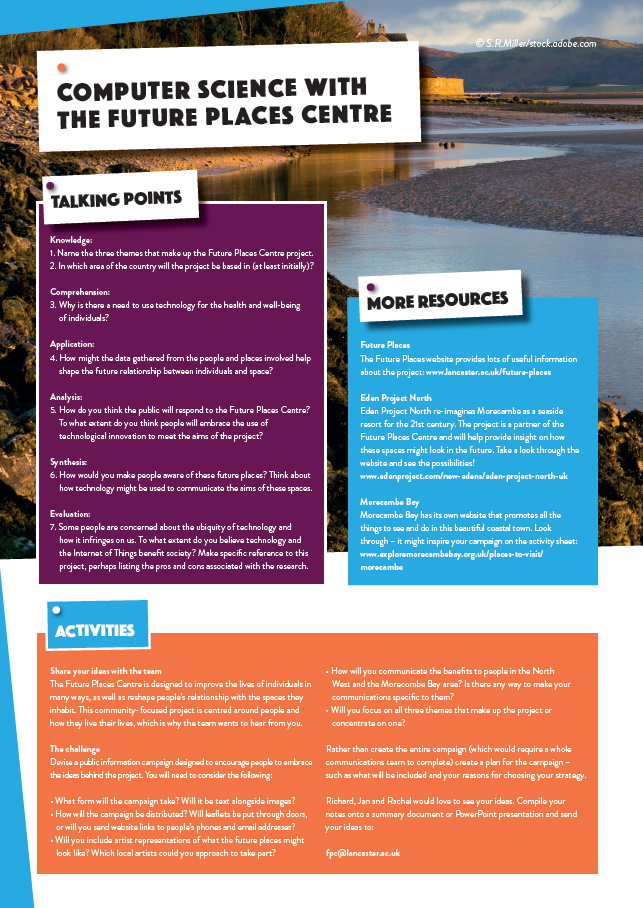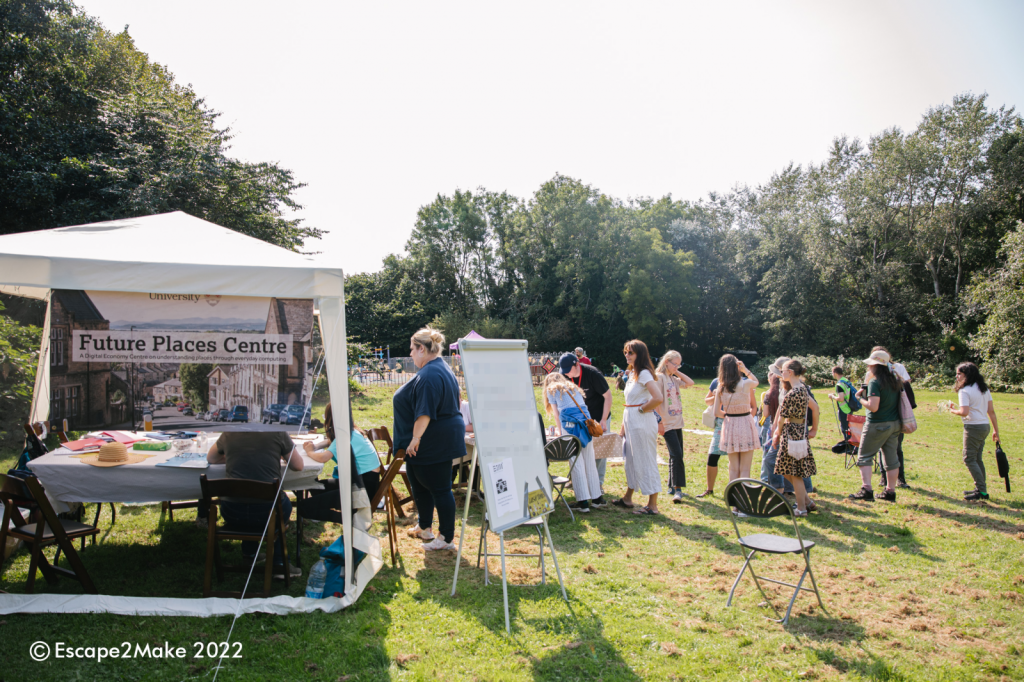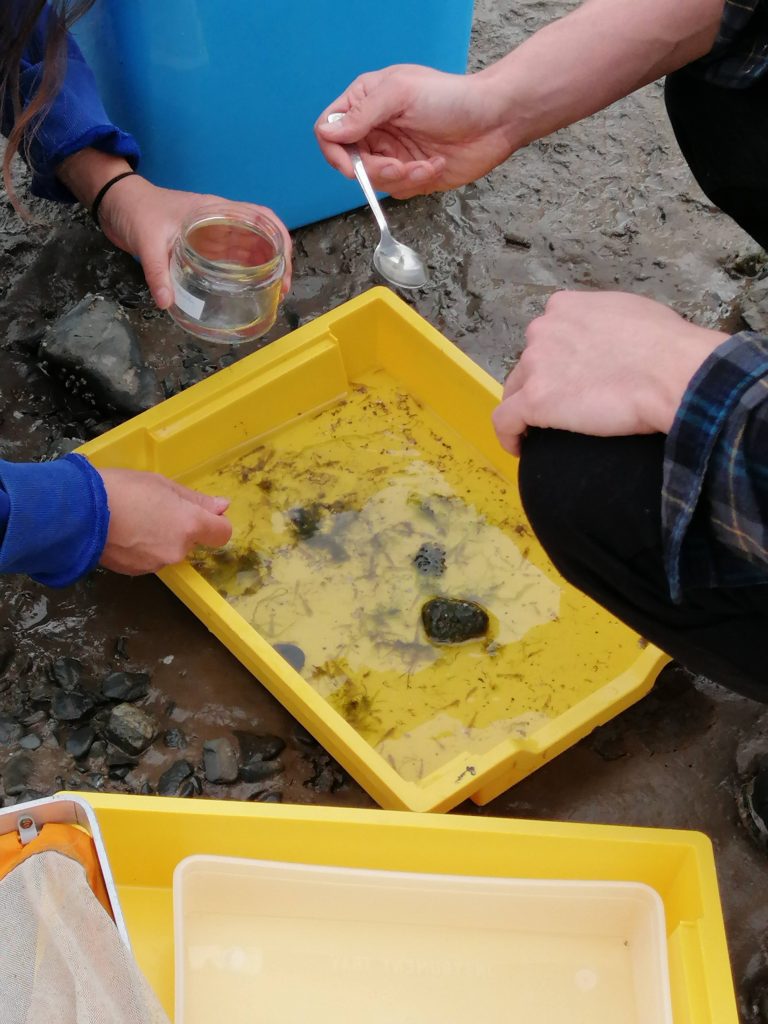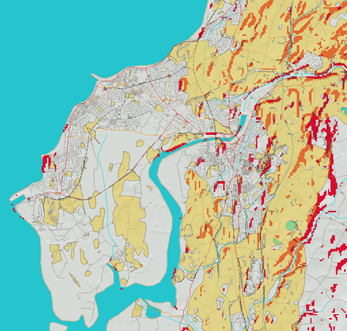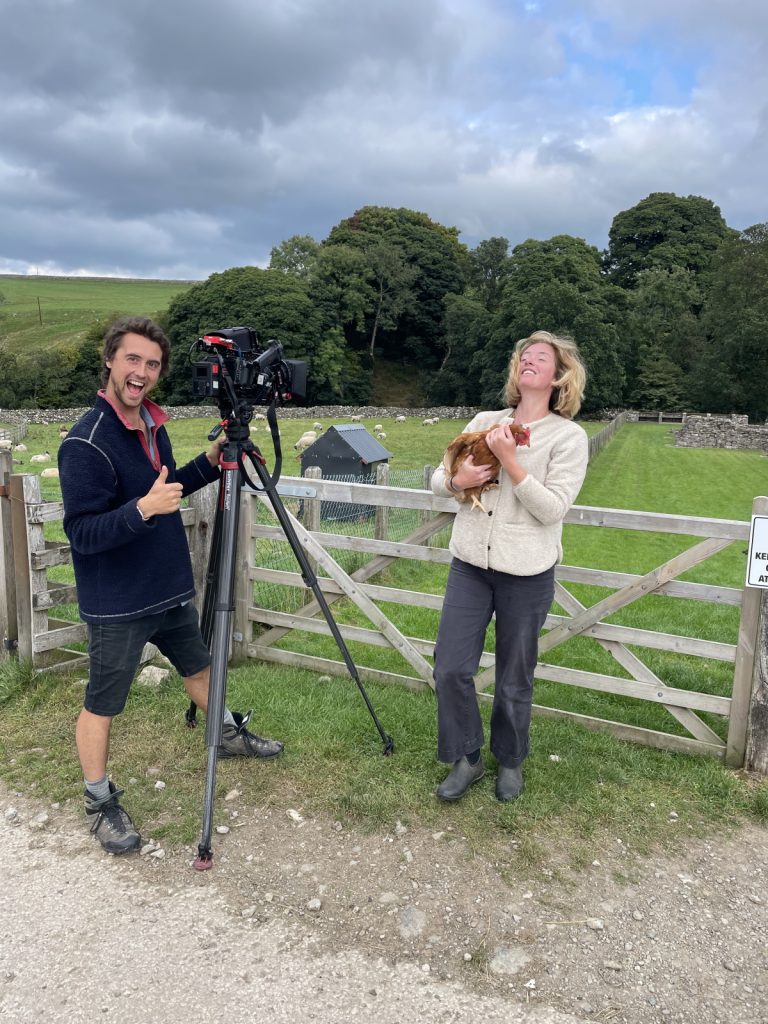How can we make future places healthier spaces?
Professor Richard Harper, based at Lancaster University in the UK, is the principal investigator of a project called the Future Places Centre. This project is investigating how computing, the Internet of Things and data science can generate information that people can use to make their future places healthier
GLOSSARY
DATA SCIENCE – encompasses preparing data for analysis, including cleansing, aggregating and manipulating the data to perform advanced data analysis
INTERNET OF THINGS – the billions of physical devices around the world that are now connected to the internet, all collecting and sharing data
SMART HOMES – a home equipped with computer-controlled lighting, heating and other domestic appliances that can be controlled remotely by smartphone or computer
ARTIFICIAL INTELLIGENCE – the ability of a computer or a robot to do tasks that are usually done by humans because they require some kind of intelligent judgements
MACHINE LEARNING – an application of artificial intelligence (AI) that provides systems the ability to automatically learn and improve from experience without being explicitly programmed
AGROECOLOGY – the application of ecological concepts and principles in farming. It is also a political movement that aims to improve the way food is grown and consumed globally
Advances in computer technology have accelerated at such a fast pace in recent years that it is no exaggeration to say that they have fundamentally changed our lives. They have done so partly because they have made computer technology so small and inexpensive. It was not so long ago that computers could be the size of a room, but most of us now carry computers around in our pocket (in the form of a smartphone). It was also the case that only large companies could afford computers but now most of us own one, if not more.
The computer technologies we use in our daily lives have become so ubiquitous and pervasive that it is difficult to imagine life without them – from how we perform tasks at school, to how we manage our homes through smart applications and voice-controlled personal assistants like Alexa.
The impact of technology, computing and the Internet of Things (IoT) is evident throughout our personal lives. Such dramatic changes provide an opportunity to (re)imagine how our lives and the spaces in which we live might be enhanced. Computer technologies can help us better understand how we use places and how that use affects our health. Computing can also let us develop more sustainable living practices. It is with these ideas in mind that Professor Richard Harper, based at Lancaster University, has helped to establish the Future Places Centre (FPC) – a research project that is exploring how people can shape their future spaces for healthier, more sustainable living.
Research at the FPC is divided into three broad themes: Natural Environment, Built Environment and Living. These themes have global relevance, but the project will be based in (and developed with) the communities and businesses within the northwest of England – particularly Morecambe Bay. Richard and the team believe that the FPC will show how places can be improved and how those places will be in the future for the people who live in them.
THE SETTING
The North West consists of a fascinating mixture of the exquisitely beautiful and the natural, alongside the changing built landscape of towns, villages and cities. “The relationship between these built environments and the natural environment is changing as people begin to realise that nature can become a part of their daily lives in ways that it didn’t use to be,” says Richard. “At the same time, new technologies are allowing society to engage with nature in liberating ways. For example, wind is now being re-discovered as a resource for free energy, allowing people to do what they want but also reminding them they can do that in harmony with nature’s ebbs and flows.”
MAKING PLACES HEALTHIER AND SMARTER
“Healthy places are complex phenomena entailing both healthy bodies and healthy minds – achieving one doesn’t always coincide with achieving the other, but, when it does, it can lead to radical improvements on all dimensions,” explains Richard. “With technologies embedded in our places, we can learn more about how we are using those places and whether we can optimise that use for different, and perhaps better, ends.”
Part of the Built Environment theme involves working in different ways on various types of building projects, from collaborating with young communities about the spaces they might use for their activities to creating better ways of maintaining and monitoring busy communications and transport networks. IoT and data science will also be used to facilitate the development of smart homes which will improve energy, waste and travel management.
PROMOTING HEALTHY LIVING
IoT tools, including wearable technologies, are already in use and enable individuals to self-monitor continuously. “People can monitor their physiological state and social practices, and judge the connection between where they are and their levels of contentment,” says Richard. “It is not always easy to define contentment and what constitutes a healthy relationship between a person and a place, but data and evidence can help us to judge the best way forwards.”
SHAPING THE FUTURE
The initial aim is to shape and influence public places, but these future places may also be where people work or socialise. These places will provide new reasons to perceive and shape spaces, which will have a small impact, at first, but the hope is that people and businesses will be encouraged to embrace, adopt and adapt the principles behind these future places. As people and businesses gather and measure more data from these future places, they will be better equipped to continue to improve the spaces. Through data, places can be made to respond to change. There are, of course, many types of change, and one example of the changes we might envision is provided by the Eden Project North, which, when completed, will demonstrate what future places might look like.
Reference
https://doi.org/10.33424/FUTURUM309
Ultimately, the FPC will help to show how technology can shape various aspects of our lives in different ways – particularly those surrounding the places we inhabit and how our relationship with spaces such as our homes can have positive impact on our health and well-being. Although the aims of the project are ambitious, we are rapidly advancing into the future, and life as we know it is always changing. The Future Places Centre is trying to ensure the changes are positive.
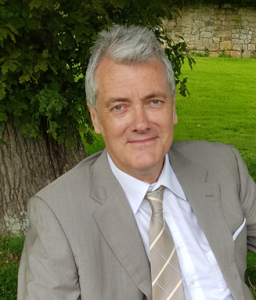 PROFESSOR RICHARD HARPER
PROFESSOR RICHARD HARPER
School of Computing and Communications, Lancaster University, UK
FIELD OF RESEARCH: Computer Science
RESEARCH PROJECT: Establishing the Future Places Centre (FPC) to explore how pervasive technologies, the IoT and new data science tools enable people to reimagine what their future spaces might be
FUNDER: UK Research and Innovation (UKRI), EPSRC Digital Economy Theme
MEET THE TEAM
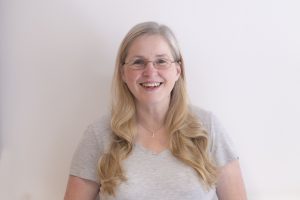
JAN HOLLINSHEAD
SENIOR RESEARCH ASSOCIATE, SCHOOL OF COMPUTING AND COMMUNICATIONS, LANCASTER UNIVERSITY, UK
As a computer scientist, Jan explores the relationship between data, people and the places they live in, and the way data impacts decision making, guides change and shapes the future.
WHAT WERE YOUR INTERESTS WHEN YOU WERE GROWING UP?
I loved the outdoors – camping, hiking and climbing. Indoors, I would be found with my nose in a book, or doing puzzles and problem solving – which was really useful for things like getting a campfire going with wet wood or finding your way back to civilisation after getting lost in the hills!
WHO OR WHAT INSPIRED YOU TO BECOME A COMPUTER SCIENTIST?
My father (an engineer) and my brother (a computer architect). Mostly though, I just tried a bunch of things and this one stuck.
HOW HAS YOUR CAREER LED YOU TO THIS CURRENT RESEARCH?
After several years travelling and doing voluntary work, I completed a degree in outdoor studies and got a job in the outdoor leisure industry working with a start-up company. I took on a variety of roles and continued learning anything I could about things that interested me. All of this gave me the skills required for research that looks at many different facets that influence people’s health and well-being and how it can be used to benefit the communities around Morecambe Bay for the future.
WHAT DOES A TYPICAL DAY LOOK LIKE FOR YOU ON THIS PROJECT?
There is no such thing as a ‘typical’ day – and that’s why I love it. If I’m working on a project, I can be deploying the tech, working with software developers or curating content. Alternatively, I could be reading past and current research on health and well-being in ‘blue’ (coastal or inland water) and ‘green’ spaces (parks or gardens), analysing datasets on populations, or writing about the wins and losses of trying to understand the world through data.
WHAT PROFESSIONAL CHALLENGES DOES THIS PROJECT POSE FOR YOU?
I have written many business reports, but I’m not experienced in writing academic reports for journals or for peer review. It’s about finding a way to combine reviewing what others have written and how they relate to our new ideas and theories.
WHAT DO YOU FIND REWARDING ABOUT RESEARCH IN YOUR FIELD?
Finding ways to help people create a healthy relationship with technology, talking with likeminded people and the way collaboration helps my idea nuggets grow into something bigger and better. Ultimately, the research is about trying to make a difference to real people and real communities in my local area.
WHAT HAVE BEEN YOUR PROUDEST CAREER ACHIEVEMENTS?
I don’t really do ‘proudest achievements’ – I’m inordinately pleased with every project that works and I enjoy making things happen for other people – staff I’ve mentored, trained or just encouraged. There is always something around the corner to understand, or make work, and that will always be something I’m proud of.
JAN’S TOP TIP
Have an enquiring mind – ask why. Try to understand how it all fits together, how it works, and the rest of it will fall into place. Those lightbulb moments are amazing!
EXPLORE CAREERS IN COMPUTER SCIENCE
• Computer Science UK provides a wealth of learning resources via a suite of useful websites.
• Computer science often leads to combining work with further study in the future through Knowledge Transfer Partnerships.
• According to Check Salary, the average salary for a computer scientist in the UK is £42,000, although this will largely depend on your role and experience.
PATHWAY FROM SCHOOL TO COMPUTER SCIENCE
Alongside subjects such as maths and computing, Jan believes the key is to learn how you learn. “Find out what subjects you are passionate about and then run with those,” she says. “Computing touches all aspects of society and education, so there is a huge crossover with many different subjects.”
You may choose to continue your studies at postgraduate level, studying a computer science subject in greater detail through an MSc or PhD.
www.prospects.ac.uk/careers-advice/what-can-i-do-with-my-degree/computer-science
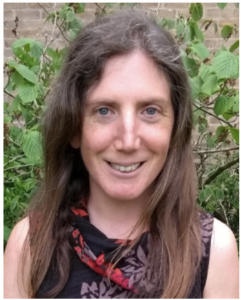
DR RACHEL MARSHALL
SENIOR RESEARCH ASSOCIATE, KNOWLEDGE EXCHANGE FELLOW, LANCASTER ENVIRONMENT CENTRE, LANCASTER UNIVERSITY, UK
Healthy living and how we interact with the natural environment are intrinsically linked to the food we eat. An expert in food systems, Rachel is working with the Future Places Centre to form the link between digital technologies and local communities, food groups and farmers.
WHAT WERE YOUR INTERESTS WHEN YOU WERE GROWING UP?
Nature, the sea and food – so it makes sense that I’ve ended up focusing on agroecology and food! I loved science at school and any nature projects we had to do. Initially, I focused on physics and chemistry at university but realised I didn’t feel that excited about chemical bonds and abstract theories. I switched to some environmental chemistry modules and loved putting my chemistry and physics knowledge into practice learning about acid mine drainage and pollution management.
WHO OR WHAT INSPIRED YOU TO BECOME A RESEARCHER?
I’ve always enjoyed asking questions and trying to understand why things work the way they do. I wanted to do a job that would have a positive impact but also let me feed my inquisitive mind. I grew up at a time when climate change was starting to be seen as a real and growing threat, so I was drawn to working on projects that were linked to climate research. I started with a PhD in monitoring the impact of climate change on sensitive ecosystems and moved to co-developing solutions and approaches to reducing our impact on the climate.
HOW HAS YOUR CAREER LED YOU TO YOUR CURRENT RESEARCH?
I started my career as a soil scientist studying the way farming practices and climate change affect the organisms in our soil. I became increasingly concerned about the wider issues in our food system, which is when I began working in a food systems knowledge-exchange role. My work focused on working with farmers and organisations that are looking to shift how we produce food to approaches that work with (and within) our natural ecosystems (a fundamental part of agroecology).
WHAT DOES A TYPICAL DAY LOOK LIKE FOR YOU ON THIS PROJECT?
The nature of my work is very varied, so every day is different. I’m often in meetings and workshops talking to researchers and practitioners and learning more about emerging questions and challenges. I give talks to a wide variety of audiences – sometimes I’m in a field in the Lake District talking to farmers and, at other times, I’ll be talking to policy makers, researchers and food system activists.
WHAT PROFESSIONAL CHALLENGES DOES THIS PROJECT POSE FOR YOU?
One key challenge is that I have moved away from the academic position of being an impartial observer of a situation and, instead, I am actively working with others to create a different food system. People may be concerned that there is a danger in academics becoming activists, however, there are increasingly more scientists, particularly those who work on climate change, who feel they can no longer not take action.
EXPLORE CAREERS IN FOOD SYSTEMS AND KNOWLEDGE EXCHANGE
• The Organic Research Centre is the UK’s leading independent organic research organisation with a wealth of information on research and knowledge exchange activities.
• The British Society of Soil Science is committed to the study of soil and ensuring the security of food systems in the future.
• Explore careers related to food security.
• According to Prospects, starting salaries for soil scientists (which Rachel began her career as) range from £16,000 to £25,000, while those with more experience can earn up to £35,000.
PATHWAY FROM SCHOOL TO FOOD SYSTEMS AND KNOWLEDGE EXCHANGE
Rachel recommends taking subjects you are passionate about and want to spend time studying. “I focused on the sciences because I thought I wanted to be a doctor,” says Rachel. “But if I had my school and university time again, I would take environmental sciences, sociology/economics and social policy/citizenship as these are the subjects that fundamentally underpin a good understanding of the food system.”
Do you have a question for Richard, Jan or Rachel?
Write it in the comments box below and Richard, Jan or Rachel will get back to you. (Remember, researchers are very busy people, so you may have to wait a few days.)


